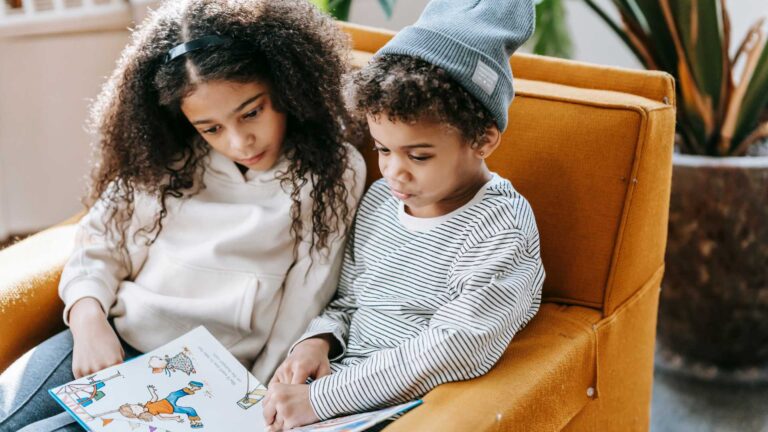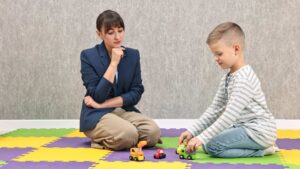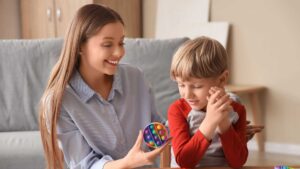Does reading books help autism?
The magic of books and stories goes beyond the printed pages; they are a window into learning, expanding the imagination, and, at times, can transform our lives. This holiday season, many parents of children on the autism spectrum embark on the search for quality autism books for kids that will benefit their little ones. A book can be a gift and an invaluable tool for children with autism to connect with the world around them and better understand the expectations it presents. Does reading books help autism? Definitely! Reading stories to children with autism enriches their vocabulary. It helps them understand emotions, prepares them for life experiences, stimulates their senses, provides examples of social behavior, facilitates communication, reduces anxiety, and supports parents with practical information.
At ABA Centers of Florida, we have compiled a list of nine autism books for kids designed to equip young children on the spectrum and their families with tools to help them cope with the everyday challenges associated with Autism Spectrum Disorder (ASD). These books explore topics relevant to neurodiverse families, such as sensory overloads and the extraordinary strengths of individuals with autism. With an educational and entertaining approach, these titles are suitable for readers of all ages and levels on the spectrum.
So, reading autism-related stories becomes a valuable activity for neurodiverse families, allowing them to connect, enjoy quality time, and learn together. Immerse yourself in the fascinating world of ASD stories!
Autism Books for Kids: Discovering the Rewards
Navigating the journey of raising a child with autism involves both embracing its rewards and confronting its challenges. Nevertheless, we can’t overstate the importance of additional support. Resources that enhance our children’s comprehension of the spectrum and provide assistance are crucial. One potent resource in this regard is literature, specifically autism books for kids, meticulously crafted to cater to young neurodivergent readers and their families.
The following nine autism-related stories offer a profound understanding of ASD and sensory experiences, fostering empathy towards those with unique abilities. These books serve as invaluable resources for parents of children with autism, educators of neurodivergent students, supporters of autism, or neurodiverse individuals themselves. In essence, they offer something valuable for every reader.
9 ASD Stories for Young Children
- “Too Much!: An Overwhelming Day” – In the hustle and bustle of everyday life, people with autism often face challenges that can be overwhelming, triggering feelings of anxiety. Jolene Gutiérrez, author and expert in the field of ASD stories, has created an invaluable tool based on her experiences. Her book, masterfully illustrated by Angel Chang, tells the story of a young girl immersed in a chaotic day filled with sensory triggers that she perceives as overwhelming.
With relatable language and vivid imagery, Gutiérrez explores the common feelings experienced by many children with autism and sensory issues. More than just a narrative, the book offers practical strategies for addressing stressful experiences, providing a valuable resource for parents, educators, and caregivers interested in supporting children with autism who face anxiety challenges. This story not only illuminates the realities of those living with autism but also provides tools to promote emotional regulation and well-being.
- “Too Sticky! Sensory Issues with Autism” – For many children with autism and sensory sensitivities, some everyday activities can be frightening and uncomfortable. “Too Sticky! Sensory Issues with Autism” poignantly addresses the sensory processing challenges faced by neurodiverse children. This book, written by Jen Malia and illustrated by Joanne Lew-Vriethoff, offers valuable insight into understanding and coping with sensory issues that can arise in everyday routines.
Through a relatable narrative and captivating illustrations, the story follows Holly, a girl with a passion for science, as she faces difficulties with a new experiment involving slime. This sticky mixture, made with glue, proves overwhelming for Holly regarding handling and texture. However, with help and some adaptations, Holly faces the challenge of discovering rewarding new experiences. This story not only highlights sensory barriers but also underlines the importance of understanding, adapting, and supporting the journey of neurodiverse children.
- “The Girl Who Thought In Pictures” – As a parent of a child with autism, you are well aware that communication difficulties pose some of the most complex challenges in managing neurodiversity. The struggle to express thoughts and feelings can impact social development and affect a child’s daily experiences. Julia Finley Mosca introduces us to the inspiring story of Dr. Temple Grandin, a real-life scientist who was diagnosed with autism in her childhood. Her unique bond with animals led her to achieve remarkable feats.
“The Girl Who Thought in Pictures,” beautifully illustrated by Daniel Rieley, recounts Dr. Temple Grandin’s experiences and achievements and imparts to readers the notion that there is no singular correct way to think or learn. As this fascinating story illustrates, being different can be a significant advantage. This cheerful and awe-inspiring tale deeply resonates, particularly with children with autism, including nonverbal children. Parents, in turn, discover a valuable tool to comprehend and foster their children’s future aspirations and dreams within this narrative.
- “A Friend for Henry” by Jenn Bailey immerses us in a moving and thoughtful story about autism. This book for children ages 3-5 follows the journey of Henry, a boy who seeks a friend to play with, share, and confide but faces significant challenges in the process. This narrative offers the unique perspective of an autistic child and becomes a valuable tool for families to discuss the importance of friendship.
With captivating illustrations by Mika Song, “A Friend for Henry” beautifully depicts the emotions and experiences of the characters while promoting a powerful message. Everyone deserves to have a friend, and our differences make us extraordinary. This story thus becomes an essential addition to your collection of autism books for kids, offering a charming and educational perspective on the importance of friendship and the celebration of diversity.
- “This Beach is Loud!” – During the holiday season, many families choose to travel, and beaches are often a popular destination. In this context, Samantha Cotterill’s book explores the sensory sensitivities that affect many children with autism, especially in noisy and crowded places, such as beaches, where experiences can be overwhelming and complicated. Perfect for the holiday season, this book presents a relatable and thoughtful story that helps children and parents understand and manage stress and sensory overload.
With vibrant illustrations and simple language, Cotterill guides us on a journey where the protagonist copes with sensory overload on a crowded beach with the help of his father. Through this autism story, parents and educators can foster empathy and understanding for people with sensory processing difficulties. In addition, the book offers more profound insight into how challenging these experiences can be for neurodiverse individuals. It also provides reassuring exercises for coping with sensory overloads, making it a valuable educational tool for families and school settings.
- “All My Stripes: A Story for Children With Autism” – An autism-related story written by Shaina Rudolph and Danielle Royer, this invaluable book has won the Mom’s Choice Award and the Gold Medal. With illustrations by Jennifer Zivoin, the book highlights the virtues of self-acceptance. Through the main character, Zane, children are encouraged to embrace diversity and individuality. Recognizing that his stripes and colors make him unique, Zane highlights how autism is simply one of his characteristics.
The plot follows Zane, a young zebra, as he learns that having autism is not a cause for shame but is part of his many “stripes” and even becomes a strength. This book is valuable for parents, caregivers, educators, and therapists as it addresses fundamental concepts such as acceptance and self-confidence. “All My Stripes” offers an essential representation of life with autism in literature, providing children with ASD with an exemplary character to look up to.
- “Masterpiece: an Inclusive Kid’s Book Celebrating a Child on the Autism Spectrum” – This book, by Alexandra Hoffman and vividly illustrated by Beatriz Mello, provides a genuine depiction of the challenges encountered by children on the autism spectrum. It takes readers through a journey that celebrates the unique talents of neurodiverse individuals and their unique struggles. The narratives within this book present an opportunity for children and adolescents with ASD to identify with the experiences portrayed, all while being immersed in vibrant illustrations and engaging dialogue.
This book transcends its role as merely beneficial for individuals with autism and their families. It also serves as a valuable resource for neurotypical children to understand and cultivate empathy for their peers on the autism spectrum. The story of Samuel, a boy with ASD, is presented as a captivating masterpiece, unveiling his exceptional perception of the world through art. This compelling narrative conveys a potent message of acceptance, inclusion, and the wealth of diversity in perspectives.
In summary, this standout among autism books for kids is an ideal gift for families interested in learning about diversity. Still, it is also a valuable educational tool and a distinctive holiday present.
- “ Never. Not for Me!” – This charming narrative about autism spectrum disorder, created by Samantha Cotterill, unfolds the story of a young girl who resists trying broccoli until her mother encourages her to venture out with this new food. This empathetic approach to introducing new foods proves particularly beneficial for children with ASD and sensory issues, enabling them to explore new experiences in a less stressful and more engaging manner.
The book, characterized by its straightforward text style and captivating illustrations, is a valuable resource for parents and educators. When looking for autism books for kids that approach fussy eating, this one facilitates introducing new foods to picky eaters, offering a perspective that promotes patience, understanding, and acceptance in a lively and engaging way.
- “My Brother Otto” – This heartwarming picture book tells the story of Otto, a boy with autism who exhibits unique behaviors and communication styles. Authored by Meg Raby and splendidly illustrated by Elisa Pallmer, this work encapsulates the essence of love and understanding that can flourish between siblings despite noticeable differences.
This narrative is a priceless addition to your collection of ASD stories, ideally suited for children between the ages of 3 and 7. Young readers will delight in following Otto’s adventures while gaining a more profound comprehension of autism. The enchanting illustrations and straightforward language make this book a perfect choice for a young audience, accentuating the beauty of diversity, fostering acceptance, and illustrating how siblings can seamlessly blend into everyday activities, thus celebrating neurodiversity.
Learn More About Autism with ABA Centers of Florida
At ABA Centers of Florida, we work daily to promote autism acceptance through our informative blogs and create friendly environments and experiences for those on the autism spectrum. We recognize ABA therapy as a fundamental tool for facilitating neurodiverse individuals to learn essential skills, enabling them to reach their full potential and navigate diverse everyday experiences with healthy coping mechanisms.
ABA Centers of Florida is available to provide autism diagnostic services, ABA therapies, and early intervention to all neurodiverse families in areas of Florida, such as Tampa, Orlando, Boca Raton, Davenport, Melbourne, Port Saint Lucie, Miramar, Doral or Kissimmee. To start this process, call us at (772) 773-1975 or complete our online form. With the right support tools, such as autism books for kids, neurodiverse children, and their families can thrive on the neurodiversity journey.








